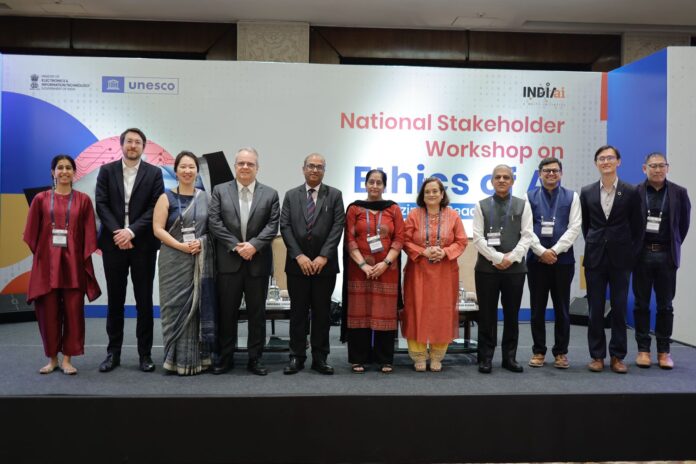
New Delhi: The workshop provided a platform for critical discussions intended at integrating safe, trusted and ethical AI considerations into the national and state-level AI strategies and programmes, ensuring that the deployment of AI technologies aligns with public welfare and adheres to international norms and standards.
United Nations Education, Scientific and Cultural Organization (UNESCO) South Asia Regional Office, in collaboration with the Ministry of Electronics and Information Technology (MeitY), hosted a national stakeholder workshop on safe, trusted and ethical AI in New Delhi on Wednesday.
The event was held at a crucial juncture, following the Government of India’s recent approval of the IndiaAI Mission, which has been allocated more than Rs 10,000 crore, marking a significant step towards bolstering India’s AI ecosystem, MeitY said in a statement.
The workshop provided a platform for critical discussions intended at integrating safe, trusted and ethical AI considerations into the national and state-level AI strategies and programmes, ensuring that the deployment of AI technologies aligns with public welfare and adheres to international norms and standards.
The workshop featured participation from senior level officials from various Central line ministries, state governments, NITI Aayog and industry partners such as NASSCOM, ensuring a broad representation of perspectives. Extensive dialogue on the concept of safe and trusted AI, its ethical implications and the societal impact of AI technologies were deliberated upon through panel discussions with breakout group sessions on India harnessing ethical implementation of AI.
In his inaugural address, Prof. Ajay Kumar Sood, Principal Scientific Adviser to the Government of India, said, “As AI raises concerns on ethics and its societal implications, India aims to adopt a balanced approach on AI. India has launched several initiatives including, the India AI mission to foster the development and adoption of AI. Globally, UNESCO has played a commendable role in promoting ethics of AI across the world and getting UNESCO Member States to support the UNESCO Recommendation on Ethics of AI is a great example.”
Abhishek Singh, Additional Secretary, MeitY, said, “When it comes to the use of the word ethics, we prefer to define it in terms of building a safe and trusted AI which will not result in user harm; which will result in ensuring a framework that will promote innovation and that will restrict the risks that are related to AI.”
Tim Curtis, UNESCO representative to India and the Director of UNESCO South Asia Regional Office, said, “AI has immense potential to contribute in achieving the Sustainable Development Goals (SDGs); it also poses significant ethical and practical risks if deployed without proper frameworks ensuring ethical development and use. UNESCO aims to support the Indian government in integrating ethical considerations into the national and state-level AI strategies and programmes, ensuring that the deployment of AI technologies aligns with and adheres to international norms and standards outlined in the UNESCO Recommendation on the Ethics of Artificial Intelligence.”
The AI is expected to add nearly $500 billion to India’s GDP by 2025, driven by advancements in various sectors such as healthcare, financial services, and telecommunications. To support this vision, MeitY has been entrusted with the responsibility of leading the IndiaAI Mission. This mission is set to further catalyze technological self-reliance across the nation through its key components, including the IndiaAI Compute Capacity, IndiaAI Innovation Centre (IAIC), IndiaAI Datasets Platform, IndiaAI Application Development Initiative, IndiaAI FutureSkills, IndiaAI Startup Financing, and Safe & Trusted AI.
The workshop’s comprehensive agenda included sessions on AI fundamentals, Ethical Dimensions of AI, UNESCO’s Role in AI ethics and the current AI policy landscape in India. By collectively enhancing understanding and preparing for challenges and opportunities presented by AI. The workshop aimed to establish a foundation for informed policy development that promotes equitable and sustainable AI adoption nationwide.
As a panellist on the discussion on AI in India: Policy and Practice, NASSCOM President, Debjani Ghosh opined, “First, humans need to adhere to ethical standards, and then extend those principles to AI. Ethics is about equity and inclusion; we cannot afford a closed sytem where only a few companies control AI.”
The ‘Recommendation on the Ethics of Artificial Intelligence’ was unanimously adopted in November 2021 by all 193 UNESCO Member States and is the first international standard setting instrument on the ethics of AI. The protection of human rights and dignity is the cornerstone of the Recommendation. This is largely based on fundamental principles such as transparency and fairness as well as to ensure the critical role of human oversight in maintaining checks in AI systems.
UNESCO is working with the Ministry of Electronics and IT, Government of India, to ensure that the core values and principles of the Global Recommendation is translated into concrete policy action with respect to data governance, environment and ecosystems, gender, education and research, and health and social wellbeing, among many other spheres.



